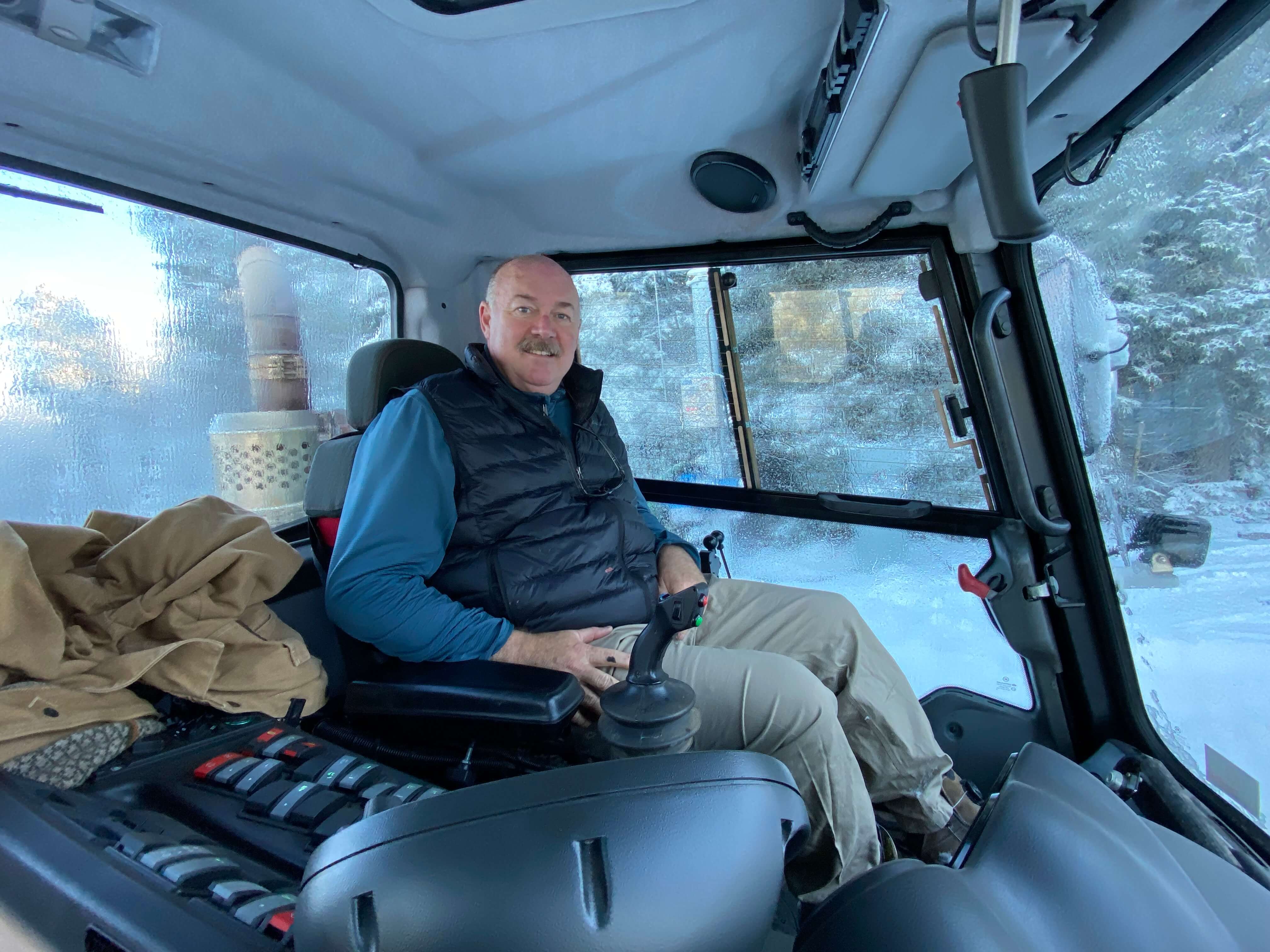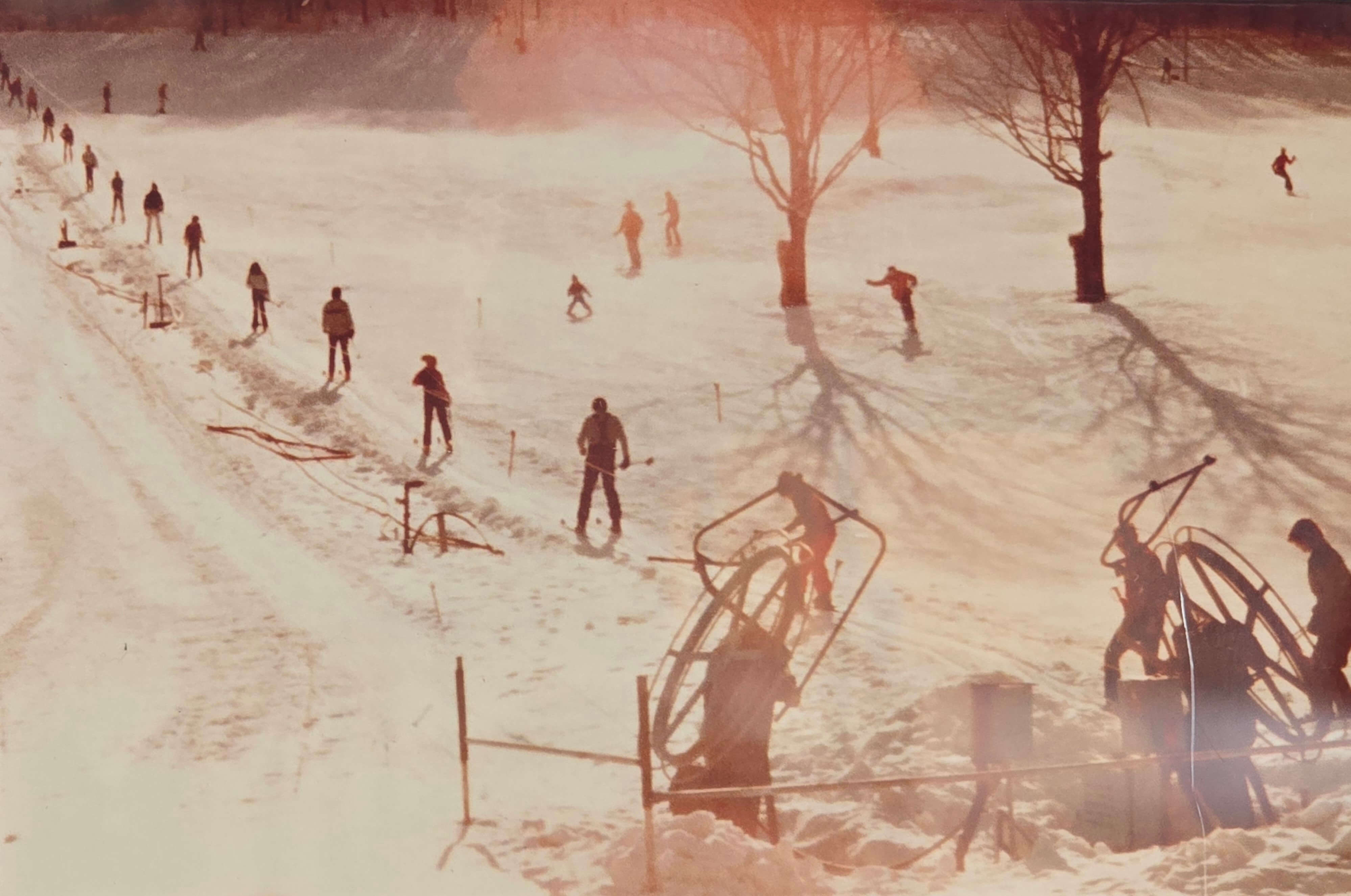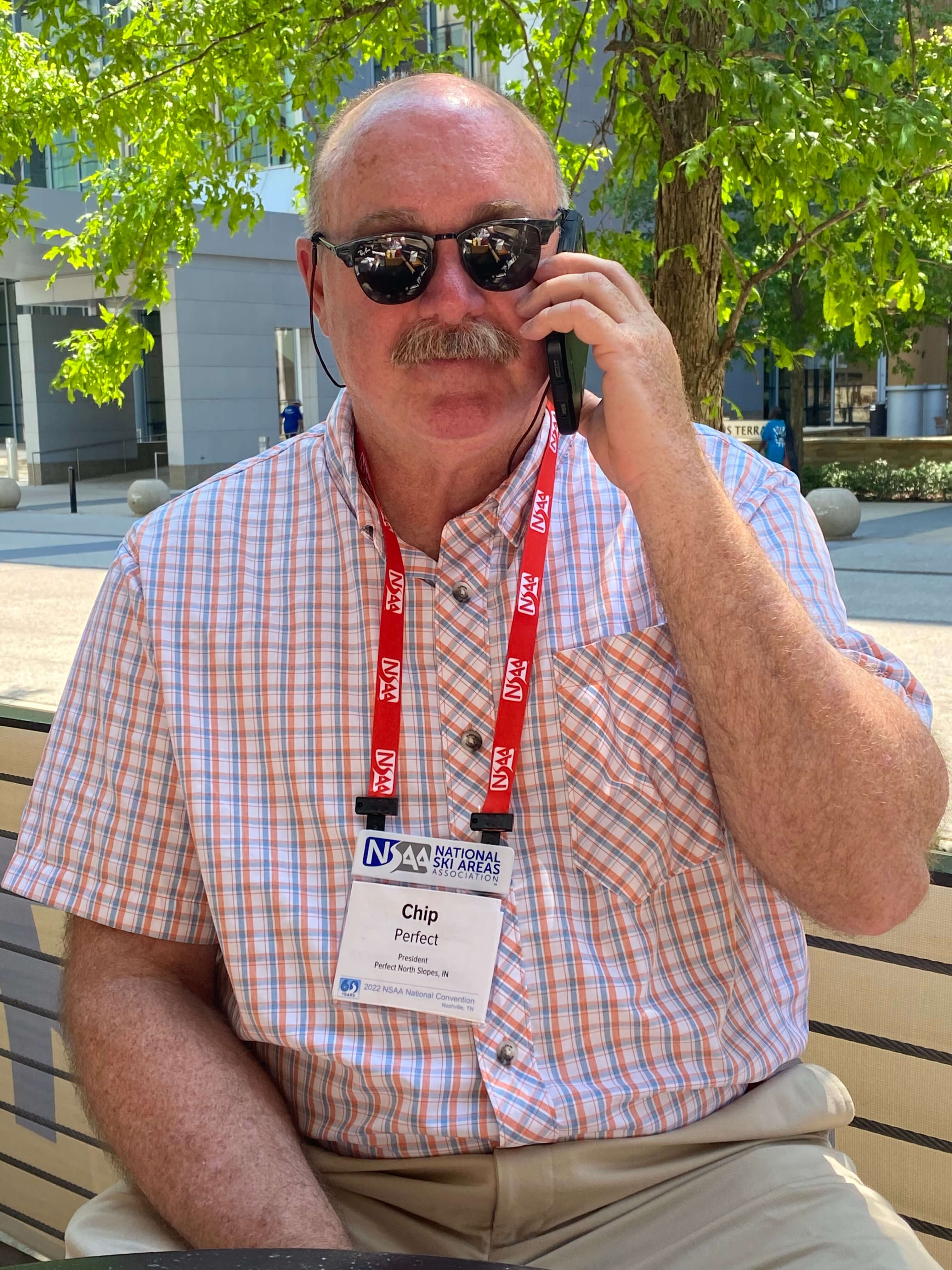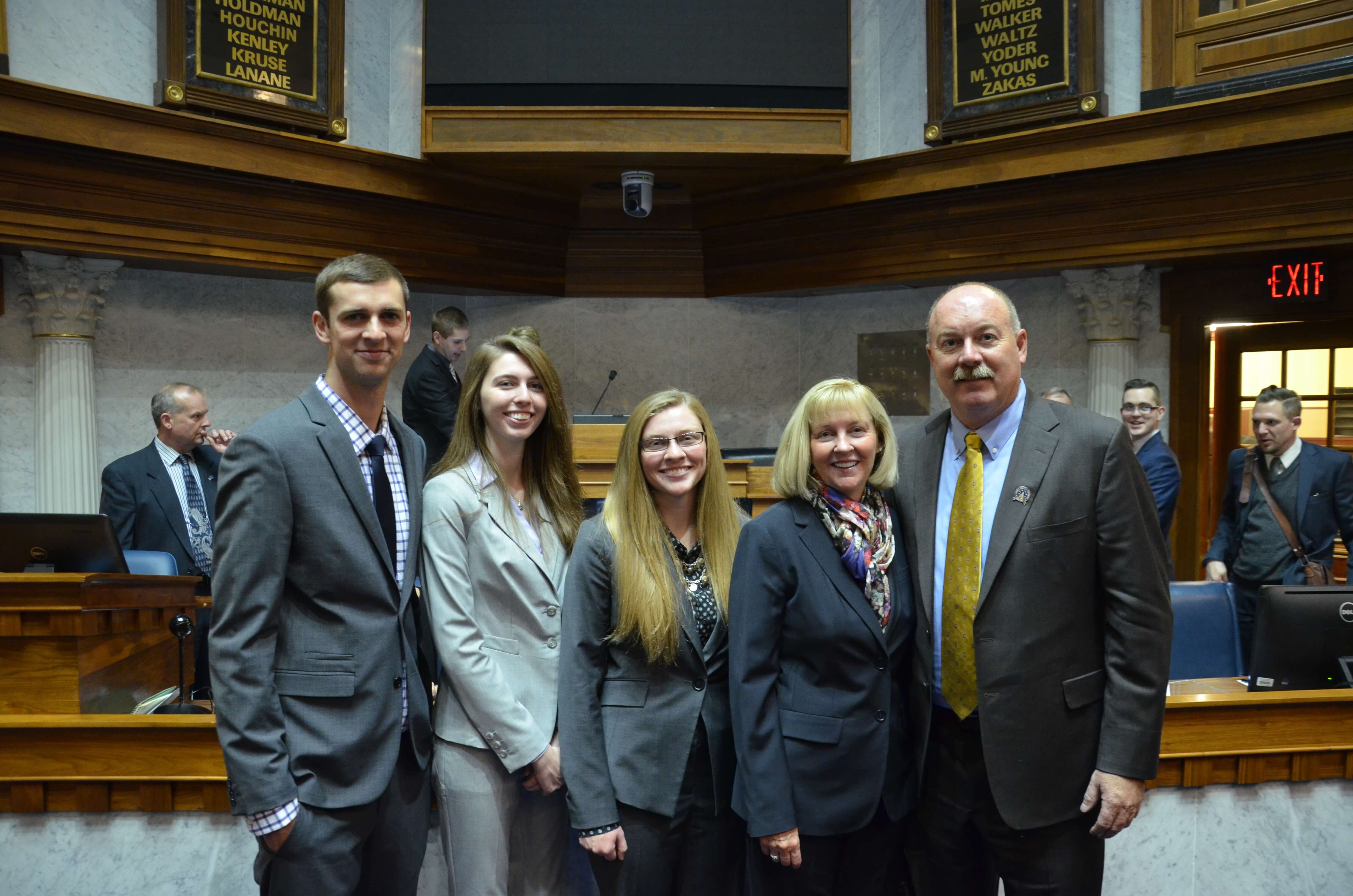2025 NSAA Lifetime Achievement Award: Chip Perfect’s Ripple Effect on Snowsports 
BY Heather B. Fried

NSAA’s Lifetime Achievement Award often goes to somebody who recently retired. Chip Perfect, president of Perfect North Slopes and CEO of Timberline Mountain, is not one of those recipients. After 45 years in the ski industry, he has no plans to retire, and some of his colleagues think he probably never will.
“Do what excites you; that’s what keeps you going in life,” is Perfect’s foremost Chip-ism, or words to live by. “Number two is, my version of retirement is doing less of what I have to do, and more of what I want to do. The combination is the ski business still excites me, and so I like doing it … certain parts of it.”
When he doesn’t have to run a groomer or climb into a bulldozer, for instance, Perfect enjoys both of those things, a testament to the hands-on involvement and dedication that come with the territory of a family business.
“How does an Indiana ski area on the Ohio River do all that? That's really what's amazing about all this,” said Dave Byrd, NSAA’s director of risk and regulatory affairs, referring to Perfect’s many noteworthy achievements. “He has just been one of the preeminent leaders for Midwestern ski areas. He's shown what small, family-operated ski areas can excel at.”
King of the side hustle, Perfect’s career so far has been one of startups, serial entrepreneurship, catalyzing change, having fun, and improving everything and everyone he touches.
Forming a Ski Area Habit
When Indiana State University student Kelly Green turned up one day at their farm with the idea for a ski area, the Perfect family was intrigued. Green had just completed a college project concluding that their hill’s north-facing slope and 30-minute proximity to Cincinnati were compelling reasons why it could work. That was 1979, and by the next year, Perfect North Slopes became the second ski area to open in Southern Indiana, with two handle tows, three rope tows and a handful of runs. Between that inkling and full fruition, the family went about researching how to start a ski area the only way you could back before the internet, “call some people up,” Perfect said.
“Much like the farm business that we had grown up in, when you talk to somebody about something they love, like people love the ski industry, they were very open to sharing ideas with us, and very welcoming,” said Perfect of the passion and camaraderie of those who answered the call — something that struck him so deeply he strived to pay it forward throughout his career. “It was really myself, my mom and dad, my older sister Tarry and her husband Todd that initially agreed that we would build this ski area together.
“And the good news is … we had different skill sets, so there was enough to do,” added Perfect. “We literally, probably for the first almost 20 years, did everything at the ski area ourselves, and a lot of that time, had second jobs to support our ski area habit.”
The term side gig hadn’t been coined yet, but that’s how the family was thinking about this new winter venture while they continued to run their 200-acre cattle and crop farm. Perfect’s father, Clyde, remained in the brick business, and Chip — freshly graduated from Purdue with a degree in agricultural education — took up teaching ag half-days at a nearby school, and then working the ski area in the afternoon and evening.
After those first 20 or so years, Clyde retired, and Chip “really came [into] his own,” said Jonathan Davis, GM of Perfect North, executive director for Timberline and currently serving on NSAA’s board. Although he may have officially taken the helm at that point, “we sort of cohabitated the leadership space,” according to Perfect.
“Everybody in my family is a leader. We were raised that way. My dad was all about the building and the self-engineering and constructing of things; my sister was more about the administration; and that left me to deal with the employees and the customers,” he said, adding with a laugh that “Surviving the ski business in Southern Indiana was challenging, but surviving the family business was even more challenging.”
Michael Berry, NSAA’s president at the time, took notice of Perfect’s leadership abilities and efforts to elevate the ski area. Berry invited him to join the board in 2004, and Perfect would go on to think of Berry as one of the great mentors and helpers of his career. Never hesitant to speak up, Perfect was an involved and vocal director, which contributed to his ascension to the executive committee in 2007 and election as the first chair from the Midwest in 2012.
“It was a really proud moment, not just for me, but for all the ski areas in the Midwest,” said Perfect. “Michael did a really great job during his tenure of breaking down the us versus them barrier, small versus large, and showed a lot of respect to the Midwest ski area operators that maybe hadn't happened in the past.”
Change-Seeking Innovator
What also turned heads in Perfect North’s direction was the sheer amount of advancement coming out of the small ski area. Not many people are fans of change; Perfect embraces it. The ski area was out front on integrating webcams, which helped with the struggle “to convince people that we had snow and everybody else didn’t,” Perfect said, adding that necessity, combined with their farming background, led to his family’s fascination with snowmaking. Even then, people were talking about blowing snow in warm temperatures, but Perfect stuck to his guns on seizing shorter, more intense windows of opportunity.
“We were one of the early adopters of really high-capacity snowmaking, capable of making a lot of snow when we did get cold,” Perfect pointed out.
Joe VanderKelen, president of SMI Snow Makers, further quantified that, adding that Perfect North Slopes is still a leader in fan guns and gallons per acre of terrain covered. With more than 100 GPM and three fan guns per acre of terrain, the ski area invested heavily in snowmaking over 25 years ago.
“They have been able to get open a lot of terrain after a 24-hour cold snap, and they were very ahead of most resorts with regards to fixed snowguns as well,” VanderKelen said, calling Perfect “a leader in our industry and also a trailblazer … for day visit resorts near big populations in a tough climate.”
VanderKelen also called out Perfect North’s tubing operation, one of the most visited in the country, for installing a long carpet lift when handle tows were the standard. The ski area also maintains pristine tubing lanes with daily grooming. Finding unique ways to welcome beginner skiers and riders has always been a strong focus for the Perfects, and not just for the sake of the region.
“I'd only skied once before we opened the ski area, and I was the expert in the family,” laughed Perfect. “We were beginners as well. So our focus was always on new skiers, which is critical in an urban market.”
Given their knowledge gaps, the family leaned heavily on its volunteer patrollers for guidance. Perfect’s wife, Ellen, was among the experienced leaders on their original ski patrol, which is how they met.
“When we got in the ski business, people [thought], sort of naively in my opinion, that they're shedding some liability by abdicating some of the responsibilities to the ski patrol,” Perfect explained. “From day one, we just recognized it as a strong partnership and realized it was important for us to make the primary decisions and be responsible for the hill; they were more about monitoring and first aid. We got a couple of great people involved, and they got other great people involved. And to this day, that continues.”
Another change Perfect nudged out of the norm was adopting a flex ticket in place of selling sessions throughout the day, according to Davis. He appreciates Perfect’s visionary nature and Steve Jobs-like way of grinding something down to its simplest form.
“It can't be so complex when somebody calls to say, ‘How much is it to ski?’ that it takes 10 minutes to explain to them,” Davis remembered of Perfect’s impetus (not to mention that his boss was known to answer the phones himself from time to time).
As Perfect refined this concept, he pioneered the early-return bonus for guests who skied fewer than four hours. What started as a $5 cash back incentive turned into an in-house credit, “which was brilliant on lots of levels: It kept the money in the business, but it also gave people an incentive to come back if it wasn't spent in the same day,” Davis explained.
“The revenue went up, people stayed longer, they had more time to practice,” he went on, adding that innovations like these started to leak out, especially with the onset of the internet. “But even before having a website, those were the kind of things that he was dreaming up and doing.”
Perfect also knew how to spot and adapt a good idea. Wachusett’s lesson credit — or learn to turn credit, per Perfect North’s spin on it — was one of those. Perfect continued to riff on the concept, reasoning that if beginner lessons were so important to conversion and longevity, then why weren’t they included in the price of a lift ticket? Against everyone’s advice, he did just that.
“Our ski school had to grow dramatically, but I think we grew not only in numbers, but in maturity that way,” added Davis. “We're still reaping the benefits from moves like that … changing the culture of ski school out of teach them how to ski … to teach them how to have fun. That made a world of difference in our pass sales and our loyalty and our conversion. That had ripple effects across the Midwest, and I would even say that it had effects across the entire industry.”
Davis and VanderKelen both mentioned rentals as another example of Perfect’s drive for constant betterment. In this department, he managed to both grow and streamline operations.
“They were way ahead in huge rental shops that efficiently moved guests through in record time with good gear sized correctly,” said VanderKelen.
One of those efficiencies had to do with tightening up their sizing offerings, according to Davis, who also brought up the SARA (ski area rental accessory) program. Perfect was instrumental in developing this buying group to boost the quality of rentals and ensure the lowest price for the smallest ski areas.
“His early support of programs like SARA-BP, industry specific insurance and electronic waivers, and incident reporting had him shaking up the snow globe when many were comfortable with it just sitting on the shelf,” wrote Davis in his introduction speech for the 2018 presentation of Perfect’s Jim VanderKelen Lifetime Achievement Award.
This honor recognizes an individual from the Midwest who has contributed to the ski industry’s success, according to VanderKelen. Perfect, who also chaired the Midwest Ski Areas Association board, was a model recipient, embodying the spirit of snowsports and attributes such as entrepreneur and risk taker.
“Chip has been so great at sharing information with others, solving complex problems that translated to our resorts benefiting from those solutions, and leading a growing business that creates lots of new participants in our sport,” said VanderKelen. “The themes we hear over and over again from guests who visit PNS are clean, efficient, family friendly and hosts of super fun events. Chip is smart, well respected, a great mind in our industry and has given back to many industry associations for his entire career.”
Chipping Away
Before reviving Timberline Mountain, W.Va., Perfect — who has fun turning an operation around — purchased Mad River Mountain, Ohio, with Tim Boyd in 2000, during the early days of Peak Resorts. Perfect also partnered with Rob Walz on Cascade Mountain, Wis., in 2006 to help revamp operations after Walz’s parents retired. These side projects highlight the ski biz hat Perfect can’t help but don whenever opportunities come along to “help out friends in the industry to lift them to a higher level,” said Davis.
That entrepreneurial hat went right back on toward the end of 2019 when Timberline came up for auction in a federal foreclosure sale. Perfect had long been looking for expansion opportunities with an eye on Timberline, a ski area with a 1,000-foot vertical situated 6.5 hours east of their Indiana property. The auction quickly surpassed their original $2 million ceiling, but Davis got the green light for one more bid during a frenzied text exchange with Perfect. Although they were the second highest bidder, Perfect North wound up winning Timberline for $2.2 million. They got right to work on a $10 million overhaul, putting in a carpet-loading quad and West Virginia’s first six-pack chairlift, installing new snowmaking, renovating the lodge, and reopening for the 2020–21 ski season.
“It was a great opportunity for so many of the people that we have to use their knowledge,” said Perfect, who appreciated his existing team’s support on this new endeavor. “We had about a dozen people from Indiana move there, which was a big thing, and we hired several spouses of people that moved there that had never worked for us before. It was a pretty big leap of faith in terms of, how quickly could we turn it around? How quickly could we build the culture that we wanted?”
The Mid-Atlantic skiing public responded positively to their Midwest-style of high capacity snowmaking, high volume grooming and much of the technology that Davis spearheaded, all wrapped in outstanding customer service. One big surprise, however, was how much of a driver their project has been for upgrades throughout the community.
“There's really nice houses on a lot of the slopes,” Perfect said of Timberline. “Most of them were in disrepair, and even the community [had a] lot of closed businesses. Once we got going, people started fixing up their houses, and businesses started to open again. We didn't expect any of that, but the community has really embraced this, and it's been very gratifying.”
Another learning that came out of the Timberline process: Some aspects of the business can be administered centrally, while others need to be dealt with locally. Perfect thinks that every business has a right size. They’re working toward theirs with regard to the kind of scale that justifies a significantly centralized admin, kicking the tires for opportunities to grow and diversify markets and climates.
In early March, Perfect North Slopes joined the short list of multi-resort operators with three or more ski areas when they welcomed Swiss Valley Ski & Snowboard Area into the fold (planned project announcements forthcoming in the months ahead). The Southwest Michigan ski area is roughly 250 miles north of Perfect North Slopes, and nestled right between Chicago and Detroit, about a 2.5-hour drive from each. Founded in 1968, Swiss Valley is a beloved, family-owned ski area that was looking for a path forward, according to Davis. Despite putting their heart and soul into it, they weren’t in a position to take on the significant risk and debt for that next step of necessary investments.
“When this family approached us, the ethos of how they operate and what they want their family legacy to be [all] lined up, and it made a lot of sense to me,” continued Davis.
Perfect Politician
Besides his ski areas, Perfect has gotten involved with at least 20 other startups and owns many businesses, from a local movie theater and restaurants to a dirt track speedway. You don’t get to be a magnate of that magnitude without a few grievances. One thing that particularly frustrated him was that their best and brightest were spending more time crossing and dotting regulatory Ts and Is than on delivering a great guest experience. Not one to complain without taking action, Perfect started to get more politically involved.
“Before I knew it, I was elected to the Indiana Senate,” said Perfect of his next “interesting little side gig” that spanned 2014–2023.
 As a Republican Senator representing District 43, Perfect’s penchant for change bumped up against the government’s default setting for sameness. Perfect became the “self-appointed voice of reason in the Indiana Senate,” who took it upon himself “to keep us from doing stupid things.” Rising rather rapidly, he joined the Appropriations Committee within three years, chaired the Commerce and Technology Committee, and was eventually involved with several significant pieces of legislation.
As a Republican Senator representing District 43, Perfect’s penchant for change bumped up against the government’s default setting for sameness. Perfect became the “self-appointed voice of reason in the Indiana Senate,” who took it upon himself “to keep us from doing stupid things.” Rising rather rapidly, he joined the Appropriations Committee within three years, chaired the Commerce and Technology Committee, and was eventually involved with several significant pieces of legislation.
One of Perfect’s goals early on was to modernize labor laws around the employment of minors. Established decades ago, the existing regulations no longer had relevance, according to Perfect, who called it a ridiculous system and an impediment to both kids getting jobs and to administrating in the ski business.
“I was probably the second largest employer, not only of young people, but of anybody in the Indiana legislature, and so that was one of my areas of expertise,” he said.
Despite taking some arrows from strong media opposition, he was able to get his bill through a year later. Perfect is especially proud of the fact that many other states took up the mantle to also update their own child labor laws. Meanwhile, at the ski area, Perfect’s absence from daily operations for those eight or nine years sharpened the rest of his team to function without him, leveling up trust among staff.
“Whether he did that on purpose or allowed it to happen … I think that it helped everybody be more proactive and look at the long term,” said Davis.
The value of their newfound agility became especially pronounced when the pandemic ushered in a new buying cycle, added Davis, who found that longer lead times necessitated quick decision-making without all the information. When it comes to these kinds of judgement calls while he’s away, Perfect likes to know that his leaders are similar, but not identical to his own way of thinking.
“As he told me, ‘Jon, you're in the spot you're in because we make decisions the same way 90% of the time,’” recalled Davis. “He's glad that it's not 100% of the time, because he needs somebody who tells him when he's off track.”
One of the hardest parts of being in charge, in Perfect’s view, is knowing when you’re wrong. He prioritized building a team that’s willing to speak up when an idea isn’t great, “because they’re not all winners,” he laughed. To that end, Perfect’s had lots of practice recognizing and retaining talent, counting Davis among his exceptional employees.
“He was just a superstar from the beginning. He had an acumen for technology that we didn't have,” said Perfect. “Turning Jonathan loose and letting him lead us in the area of technology allows us to continue to be innovative, and frankly, do some things that I think other ski areas ought to that aren't.”
Likewise, Davis’ deference toward Perfect encompasses his thought leadership, relentless pursuit of “excellence in the ski industry since he dipped his toe in 1980,” his ability to build authentic, lifelong relationships “to a point where his cup was overflowing back to all those around,” and that he continued to use that influence across the community, Midwest region and ski industry proper. Just as important and inspiring to Davis, Perfect never lost the spark.
Many common currents run throughout Perfect’s businesses (like the importance of maintaining your women’s bathroom TP inventory), but the ski industry keeps him on his toes like no other. He thinks of the season as 90, one-day events “because none of them are the same.” One day, for instance, you could be rallying the troops around affordable lifts for smaller ski areas, and the next day find yourself with two bulldozers stuck in the snowmaking pond’s sludge (a great story for another day).
“Of all the business I've been involved in, there are just none of them that come as close to as many if/thens — if this happens, then we do this — as the ski business,” concluded Perfect. “Changing course in the middle of the day or every day or every week, I still find that exciting and interesting, and it’s what keeps me going.”